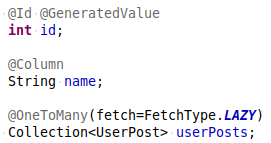Many2Many
The OrmLite ManyToMany sample is reworked as the Jpalite many2many-example project. The original sample appears in the ormlite-jdbc test sources in the com.j256.ormlite.jdbc.examples.manytomany package. The readme text explains:
"This shows how you can use a join table to implement many-to-many type of object layout." If you compare the entity classes between both implementations, you will see the main difference is in the annotations used, with JPA perhaps being more succinct using @Column, @OneToOne and @OneToMany. Using custom queries to see results is also gone.
In the Many2Many main resources is the persistence.xml JPA configuration file. It defines the following persistence unit attributes:
- name = manytomany
- classes User, Post and UserPost
- database-name = manytomany.db
Note the database is configured as in-memory, so the database name is not relevant unless there is a switch to an on-disk database.
Run the many2many-example as a Java Application from the ManyToManyMain class static main() and the expected console output will ba as follows.
Console output
Jim Coakley posted "Wow is it cold outside!!" & "Now it's a bit warmer thank goodness."
UsersByPosts:
Only Jim Coakley posted "Wow is it cold outside!!"
Both Jim Coakley and Gandalf Gray posted "Now it's a bit warmer thank goodness."
Test completed successfully

